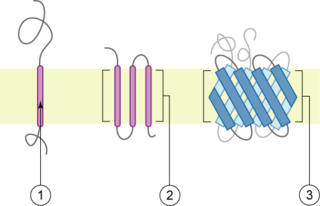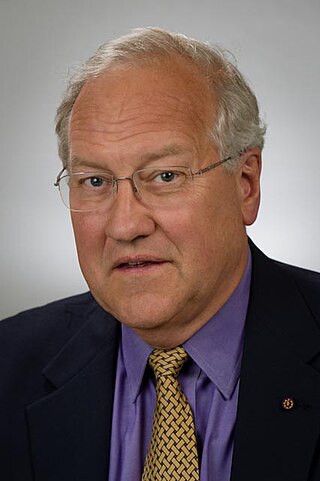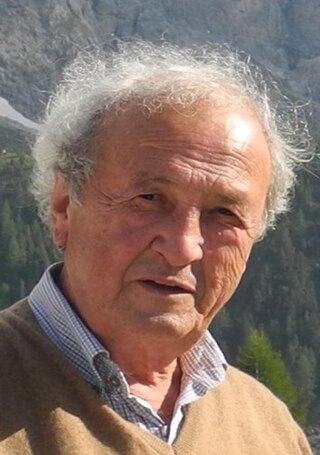
Francis Harry Compton Crick was an English molecular biologist, biophysicist, and neuroscientist. He, James Watson, Rosalind Franklin, and Maurice Wilkins played crucial roles in deciphering the helical structure of the DNA molecule.

A transmembrane protein is a type of integral membrane protein that spans the entirety of the cell membrane. Many transmembrane proteins function as gateways to permit the transport of specific substances across the membrane. They frequently undergo significant conformational changes to move a substance through the membrane. They are usually highly hydrophobic and aggregate and precipitate in water. They require detergents or nonpolar solvents for extraction, although some of them (beta-barrels) can be also extracted using denaturing agents.
A polyproline helix is a type of protein secondary structure which occurs in proteins comprising repeating proline residues. A left-handed polyproline II helix is formed when sequential residues all adopt (φ,ψ) backbone dihedral angles of roughly and have trans isomers of their peptide bonds. This PPII conformation is also common in proteins and polypeptides with other amino acids apart from proline. Similarly, a more compact right-handed polyproline I helix is formed when sequential residues all adopt (φ,ψ) backbone dihedral angles of roughly and have cis isomers of their peptide bonds. Of the twenty common naturally occurring amino acids, only proline is likely to adopt the cis isomer of the peptide bond, specifically the X-Pro peptide bond; steric and electronic factors heavily favor the trans isomer in most other peptide bonds. However, peptide bonds that replace proline with another N-substituted amino acid are also likely to adopt the cis isomer.
Krishna Kumar is an Indian American chemist whose research spans organic chemistry, chemical biology, bioorganic chemistry, biophysics and cell biology. He is currently Robinson Professor of Chemistry and was also Chemistry Department Chair from 2006 to 2009; and from 2012 to 2018 at Tufts University.

Darshan Ranganathan was an organic chemist from India who was known for her work in bio-organic chemistry, including "pioneering work in protein folding." She was also recognized for her work in "supramolecular assemblies, molecular design, chemical simulation of key biological processes, synthesis of functional hybrid peptides and synthesis of nanotubes."
Erich Schelling was a German architect.

Henning Stahlberg is a German physicist and Professor at the Swiss Federal Institute of Technology Lausanne and the University of Lausanne, Switzerland.
Stephen H. White is an American Biophysicist, academic, and author. He is a Professor Emeritus of Physiology and Biophysics at the University of California, Irvine.

Christine Anne Orengo is a Professor of Bioinformatics at University College London (UCL) known for her work on protein structure, particularly the CATH database. Orengo serves as president of the International Society for Computational Biology (ISCB), the first woman to do so in the history of the society.
David Domingo Sabatini is an Argentine-American cell biologist and the Frederick L. Ehrman Professor Emeritus of Cell Biology in the Department of Cell Biology at New York University School of Medicine, which he chaired from 1972 to 2011. Sabatini's major research interests have been on the mechanisms responsible for the structural complexity of the eukaryotic cell. Throughout his career, Sabatini has been recognized for his efforts in promoting science in Latin America.

Anne Jacqueline Ridley is a British biologist who is professor of Cell Biology and Head of School for Cellular and Molecular Medicine at the University of Bristol. She was previously a professor at King's College London.

Robert A. Lamb was a British-American virologist. He was the Kenneth F. Burgess Professor at Northwestern University and since 1991, an investigator of the Howard Hughes Medical Institute. From 1990 to 2016, he was the John Evans Professor of Molecular and Cellular Biology at Northwestern University.
Ka Yee Christina Lee is Hong Kong-born American chemist. She is Executive Vice President for Strategic Initiatives and the David Lee Shillinglaw Distinguished Service Professor in the Department of Chemistry at the University of Chicago. She works on membrane biophysics, including protein–lipid interactions, Alzheimer's disease and respiratory distress syndrome. She is a Fellow of the American Institute for Medical and Biological Engineering and American Physical Society.

Mei Hong is a Chinese-American biophysical chemist and professor of chemistry at the Massachusetts Institute of Technology. She is known for her creative development and application of solid-state nuclear magnetic resonance (ssNMR) spectroscopy to elucidate the structures and mechanisms of membrane proteins, plant cell walls, and amyloid proteins. She has received a number of recognitions for her work, including the American Chemical Society Nakanishi Prize in 2021, Günther Laukien Prize in 2014, the Protein Society Young Investigator award in 2012, and the American Chemical Society’s Pure Chemistry award in 2003.
Karen Renee Gibson Fleming is a Professor of Biophysics at Johns Hopkins University. She investigates the energetics of transmembrane helix-helix interactions. Fleming was awarded the 2020 Protein Society Carl Brändén Award.
Barbara Imperiali is a Professor of Biology and Chemistry at Massachusetts Institute of Technology and Affiliate Member of the Broad Institute. She is an elected member of the National Academy of Sciences and a Fellow of the Royal Society of Chemistry.
Shuguang Zhang is an American biochemist. He is at the MIT Media Lab's Laboratory for Molecular Architecture. Shuguang Zhang's research focuses on designs of biological molecules, particularly proteins and peptides. He has published over 200 scientific papers, which have cumulatively been cited over 40,300 times with an h-index of 96. On the “Updated science-wide author databases of standardizes citation indicators”, he is ranked 18th worldwide in the field of Biomedical Engineering. Zhang is also a co-founder and board member of Molecular Frontiers Foundation, which organizes annual Molecular Frontiers Symposia in Sweden and around the world. The selected winners are awarded Molecular Frontiers Inquiry Prize.
Kalina A. Hristova is a Bulgarian–American engineer. She is a professor of materials science and engineering at Johns Hopkins University's Whiting School of Engineering.

Luis Moroder was an Italian peptide chemist, who pioneered research on the interactions between peptide hormones and cell membrane-bound hormone receptors. He later expanded this research to other biological systems of medical relevance such as protein inhibitors, collagens, and synthetic proteins. A hallmark of his research is interdisciplinarity as reflected in his use and development of methods in organic chemistry, biophysics and molecular biology. He was a co-editor of the five-volume Houben-Weyl, Methods of Organic Chemistry, Synthesis of Peptides and Peptidomimetics. From 2008 he was the editor-in-chief of the Journal of Peptide Science, the official journal of the European Peptide Society.
Gerd Ulrich "Uli" Nienhaus is a German physicist who is a professor and director of the Institute of Applied Physics, Karlsruhe Institute of Technology (KIT). At the KIT, he is also affiliated with the Institute of Nanotechnology, Institute of Biological and Chemical Systems, and Institute of Physical Chemistry, and he is an adjunct professor at the University of Illinois at Urbana-Champaign.








